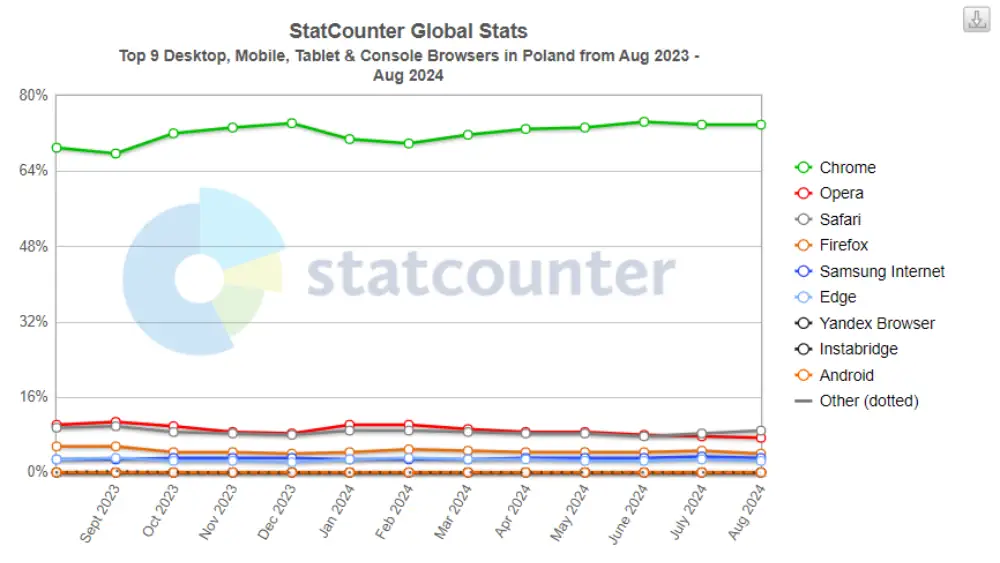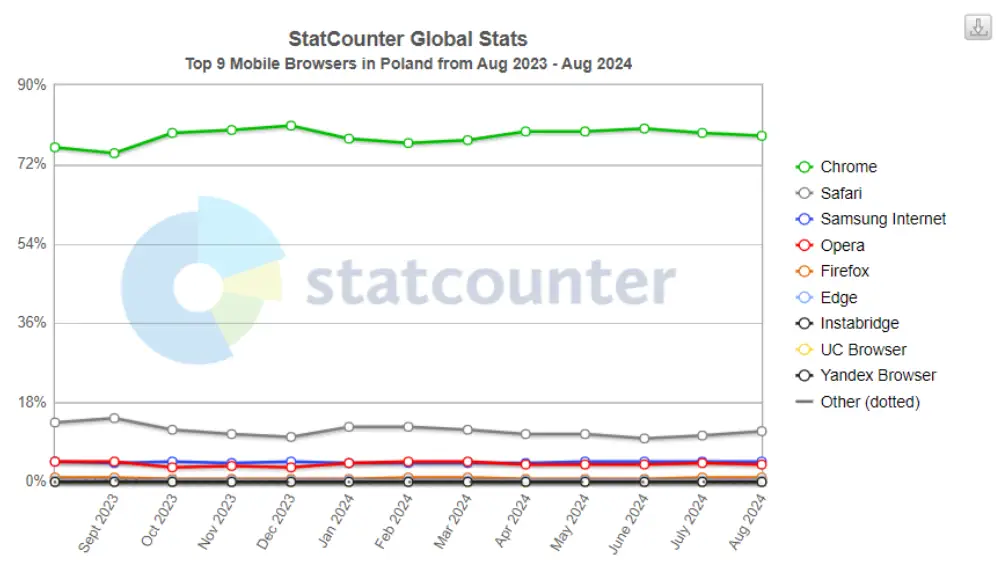 illustration: bing.com/create
illustration: bing.com/createIn the summer of 2024, a historic shift occurred in Poland`s browser market. In July and August, Safari, the default browser on Apple devices, surpassed Opera on all devices for the first time. StatCounter`s data reveals that Safari has been steadily increasing its market share among Polish users, while Opera`s position has been declining.
In January 2024, Opera had an edge over Safari with a market share of 10.18%. However, within a few months, the situation shifted. In May, Safari held 8.13%, while Opera had 8.54%. By summer, Safari ultimately overtook Opera, as confirmed by August data showing Safari at 9.89% and Opera down to 8.41%.
| Month | Chrome | Safari | Opera |
|---|---|---|---|
| 2024-01 | 70.87% | 8.80% | 10.18% |
| 2024-02 | 69.81% | 8.81% | 10.13% |
| 2024-03 | 71.68% | 8.50% | 9.23% |
| 2024-04 | 73.03% | 8.16% | 8.50% |
| 2024-05 | 73.25% | 8.13% | 8.54% |
| 2024-06 | 74.48% | 7.68% | 7.85% |
| 2024-07 | 73.73% | 8.16% | 7.51% |
| 2024-08 | 71.99% | 8.90% | 7.33% |
Why Did Safari Surpass Opera?
The popularity of Safari in Poland is primarily driven by the growing number of Apple device users. StatCounter’s report shows that Apple is gaining market share in smartphones, which directly boosts Safari`s popularity as the default browser on iPhones, iPads, and MacBooks.
Safari owes its market position to several factors:
- Better integration with the Apple ecosystem: iPhone and other Apple device users prefer Safari as it syncs data like bookmarks, passwords, and browsing history across devices.
- Increased trust in Apple: Safari is marketed as a privacy-focused browser. Apple`s strong emphasis on data protection attracts more users to Safari.
- Growing Apple device sales: StatCounter data shows that the rise in Safari users is linked to Apple`s dynamic sales growth in Poland`s mobile and computer sectors in 2024.
Safari, with an 8.80% share in January 2024, reached 8.90% in August. During this time, Opera`s share fell from 10.18% to 7.33%, reflecting a clear downward trend.
Google Chrome: The Unchallenged Leader
Despite shifts between Safari and Opera, Google Chrome remains the unchallenged leader in Poland. Holding a 70.87% share in January 2024 and 71.99% in August, Chrome dominates on both computers and mobile devices.
Why does Chrome continue to reign supreme?
- Universality: Chrome runs on nearly every operating system. Android users have it pre-installed, and it`s also widely chosen on Windows and macOS computers.
- Data synchronization: Like Safari, Chrome offers data synchronization of bookmarks, passwords, and browsing history across devices, making it highly convenient.
- Speed and performance: Google continually invests in Chrome`s development, enhancing its speed and functionality, attracting millions of users.
Data shows that Chrome commands nearly three-quarters of Poland`s browser market, a dominance difficult for competitors to challenge. This highlights Google’s strong position in the industry.
 source: StatCounter Global Stats - Browser Market Share
source: StatCounter Global Stats - Browser Market ShareOpera: A Declining Player
Though Opera has been a strong player in Poland’s browser market for years, its share in 2024 is declining. In January, Opera held a 10.18% share, but by August, this had fallen to 7.33%. This decline can be attributed to several factors.
- Increasing competition from Safari: Users with Apple devices are increasingly choosing Safari over installing additional browsers.
- Saturation of the Android market: Google Chrome dominates on Android devices, and Opera is no longer as popular as it once was. Many users stick with the default browser.
- Lack of significant innovations: Although Opera has introduced features like a built-in VPN and ad blocking, it hasn’t attracted new user groups. StatCounter notes that the lack of major updates in 2024 may explain its decline.
Firefox and Edge: On the Margins
Firefox and Edge remain marginal players in Poland’s browser market. Firefox, once a strong alternative to Chrome, is losing users, especially on mobile devices. In 2024, its share fell to 4.30% in March and didn’t improve through the summer.
Microsoft Edge, despite strong promotion by Microsoft, hasn’t attracted a significant number of users. With a share of less than 3%, Edge remains a niche player in Poland’s browser market.
Mobile Browsers
In 2024, Poland`s mobile browser market was dominated by three main browsers: Google Chrome, Safari, and Samsung Internet. According to StatCounter, Google Chrome reigns supreme, reaching an 80.77% share in December 2023. Pre-installed on most Android devices, Chrome is the natural choice for smartphone users. Its popularity stems from excellent synchronization with other Google devices and intuitive use, appealing to both younger and older users.
 source: StatCounter Global Stats - Browser Market Share
source: StatCounter Global Stats - Browser Market ShareSafari ranks second, mainly due to Apple’s dominance in the premium device segment. In August 2024, Safari held a 13.32% share of the mobile market, though it dropped to 10.25% by December. Apple heavily promotes its browser within the iPhone ecosystem, a strategy evident in Poland, where Apple user numbers are growing. Safari stands out for its optimization on Apple devices and high level of privacy protection, appealing to users concerned about online threats.
Samsung Internet holds the third position, with a 4.44% share in December 2023. Pre-installed on Samsung devices, its market presence is understandable. Although its share is relatively small, Samsung Internet attracts users with privacy features and easy access to popular apps. In 2024, Samsung focused on enhancing its browser, integrating it with AI-driven services, which may boost its popularity in the coming years.
Opera, despite its historical standing, is losing ground in the mobile segment. In December 2023, its share dropped to 3.39%, signaling that users prefer browsers with better integration with operating systems.
COMMERCIAL BREAK
New articles in section Media industry
How artificial intelligence misrepresents the news. PBC analysis
Sylwia Markowska
In news summaries generated by the most popular models in Polish, as many as 46% of responses contained at least one significant error, 27% had serious issues with sources (missing, misleading, or incorrect), and 19% contained hallucinations and outdated information.
Children and communication with machines. Experiment by SWPS researchers
SWPS
How do primary school students treat humanoid robots? Researchers from SWPS University have shown that in most cases, children relate to robots politely, and younger children and girls more often perceive them as possessing human characteristics.
Streaming platforms in Poland. What criteria determine the choice
Paweł Sobczak
Price, indicated by 54.2% of respondents, and subject matter (54% of indications) are the most important factors influencing users' choice of content on streaming services. The service brand is mentioned by 18.1% of those surveyed.
See articles on a similar topic:
Gen Alpha avoids tough topics. What young people are really looking for
Krzysztof Fiedorek
Generation Alpha prefers humor in 46% of cases, while only 12% are interested in news and political topics. Young people and children consciously limit what negatively affects their emotions - according to the report "Gen Alpha Unfiltered" published by GWI.
Radio Fanatics. Who Listens for One-Third of the Day?
Bartłomiej Dwornik
One in five listeners now spends over 8 hours daily listening to the radio, according to data from the Radio Track study. Since the beginning of the year, the number of these avid listeners has grown by 300,000.
Global Media Under Scrutiny. Reuters Institute Digital News Report 2024
Krzysztof Fiedorek
The “Digital News Report 2024,” developed by the Reuters Institute for the Study of Journalism, describes the landscape of digital news media based on data from 47 markets, representing more than half of the world’s population.
Artificial intelligence in newsrooms. Three realities of the AI era in media
Krzysztof Fiedorek
According to a report by the European Broadcasting Union, many newsrooms already use AI but still do not fully trust it. Audiences do not want "robotic" news, and the technologies themselves though fast can be costly, unreliable, and surprisingly human in their mistakes.





























